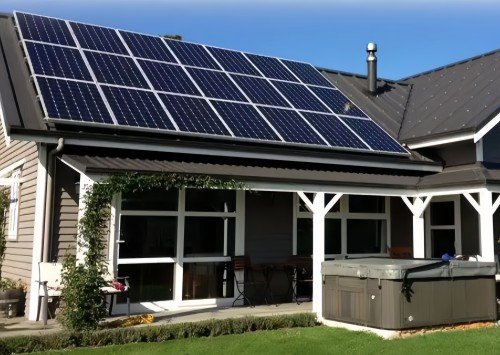Investing in a solar power inverter offers numerous financial, environmental, and practical advantages. This guide breaks down the key benefits of solar inverters, backed by real-world data and case studies from Europe to help you understand the value of this renewable energy investment.
Cost Savings
The most immediate benefit of a solar power inverter is the substantial cost savings on your electricity bills. A solar inverter helps convert the direct current (DC) electricity produced by solar panels into alternating current (AC), which can be used to power homes and businesses.
In Europe, electricity prices have been rising steadily. In countries like Germany, Spain, and Italy, the average cost of electricity is between €0.20 to €0.30 per kWh. By generating your own electricity through a solar power system, you can significantly reduce your reliance on the grid and lower your monthly utility bills.
Example:
-
A family in Spain with an average annual electricity consumption of 4,000 kWh could expect to save approximately €1,200 per year. By installing a 5 kW solar system with a high-quality inverter, they would reduce their electricity bill by about 30%. Over 25 years, this would amount to savings of over €30,000, assuming energy prices remain constant.
-
In Germany, where energy prices are high and increasing, a medium-sized home with a 6 kW solar power inverter system could generate around 5,400 kWh annually. With an average cost of €0.30 per kWh, this homeowner would save about €1,620 per year, resulting in savings of €40,500 over the system's lifespan.
Energy Independence
One of the strongest selling points of solar power inverters is energy independence. As energy prices rise and grid reliability becomes a concern, more and more people are looking for ways to take control of their own energy needs. Solar inverters allow you to generate your own power, reducing your reliance on traditional energy sources.

With an inverter that integrates energy storage, such as a hybrid inverter system, you can store excess solar energy produced during the day for use at night or during grid outages. This makes you less vulnerable to price fluctuations and power interruptions.
Case Study:
-
A home in rural France with a hybrid solar system reduced its reliance on the national grid by 90%. This family now generates 90% of their electricity needs, relying on the grid only in winter months when solar production is low. With an annual saving of €2,500 on electricity bills, their investment paid off in just 7 years, and they continue to save money each year.
-
In Italy, a business owner in a semi-rural area faced frequent grid power outages. After installing a hybrid inverter, the business saw a 50% reduction in electricity costs and experienced fewer disruptions, improving operational efficiency. This not only saved the business owner money but also reduced operational downtime.
Environmental Benefits
Solar power inverters play a crucial role in reducing your carbon footprint. Unlike conventional energy sources, solar energy produces no direct emissions during electricity generation. The environmental impact of switching to solar power can be significant, especially in countries where coal and natural gas are the primary energy sources.

By using solar energy, you can help mitigate climate change, reduce greenhouse gas emissions, and support the transition to a more sustainable energy future.
Data:
-
A typical 4 kW solar system in Germany can save around 3,500 kg of CO2 emissions annually. This is equivalent to planting 140 trees every year. Over 25 years, this totals a reduction of 87,500 kg of CO2.
-
In the UK, where the government has set ambitious goals for reducing carbon emissions, solar power systems with high-efficiency inverters can save an estimated 3.7 metric tons of CO2 per year. Over the lifetime of a solar system (approximately 25 years), the total emissions reduction can exceed 90 metric tons, helping to meet the country’s climate goals.
Increased Property Value
Investing in a solar power system with a high-quality inverter can increase the value of your property. Homes equipped with solar panels and inverters are often more attractive to potential buyers because they offer long-term savings and sustainability.
-
In the Netherlands, a house with a solar power system and inverter was sold for 5% more than similar properties without solar installations. The homeowner recouped an additional €15,000 on the sale, thanks to the added value of the solar system.
-
In the UK, studies show that properties with solar panels can command a price premium of 4-5%. In areas with high demand for eco-friendly homes, this increase can be even higher. For example, in London, a home valued at €500,000 could increase in value by up to €25,000 if equipped with a solar system and inverter.
This increase in property value makes solar power systems a smart investment, especially in the context of the growing demand for energy-efficient and environmentally responsible properties.
Technological Advancements
Solar technology has advanced significantly in recent years, making it more efficient, reliable, and accessible. Modern inverters are capable of higher efficiency rates, improved safety features, and better integration with home energy management systems.

-
Smart inverters allow homeowners to monitor energy production and consumption remotely via smartphone apps. These inverters provide detailed data on system performance, allowing for better energy management and troubleshooting.
-
Hybrid inverters, which combine solar power generation with battery storage, are gaining popularity in Europe. These inverters not only convert solar energy but also store excess power in batteries for later use. This technology is especially beneficial for homes in areas with frequent grid outages or for those looking to become fully energy independent.
Example:
-
In Spain, a homeowner with a hybrid inverter and 10 kWh battery storage system saw a 50% reduction in their electricity bill, while also ensuring backup power for essential appliances during grid failures. This system cost €12,000 to install but is expected to save the homeowner €3,000 annually on their electricity bills, paying for itself in just 4 years.
-
In Germany, the latest inverter models can achieve efficiency rates of over 98%, meaning that almost all of the energy captured by solar panels is converted into usable electricity, minimizing energy loss.
Conclusion
Investing in a solar power inverter is more than just a way to save money—it’s a forward-thinking decision that offers numerous long-term benefits. From cost savings on your electricity bills to energy independence, environmental benefits, and an increase in property value, the advantages of solar inverters are substantial.
With the added benefit of technological advancements like smart and hybrid inverters, it’s clear that solar power systems are a valuable investment for European homeowners and businesses. The combination of financial savings, sustainability, and energy independence makes the installation of a solar inverter an investment that pays off for years to come.
By adopting solar power inverters, you’re not just investing in your home or business—you’re investing in a more sustainable, cost-effective future.




